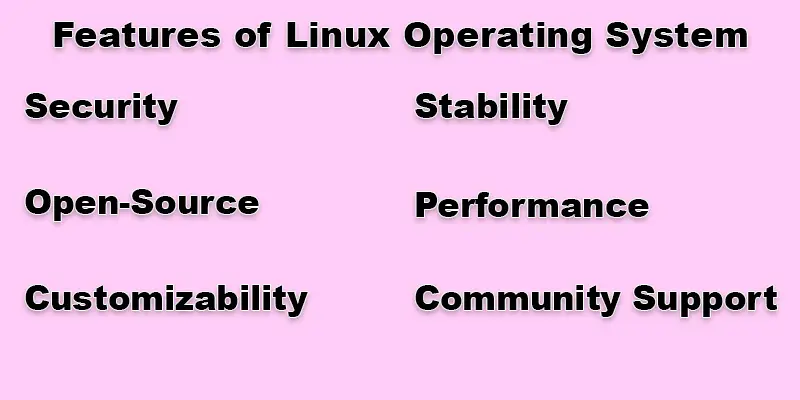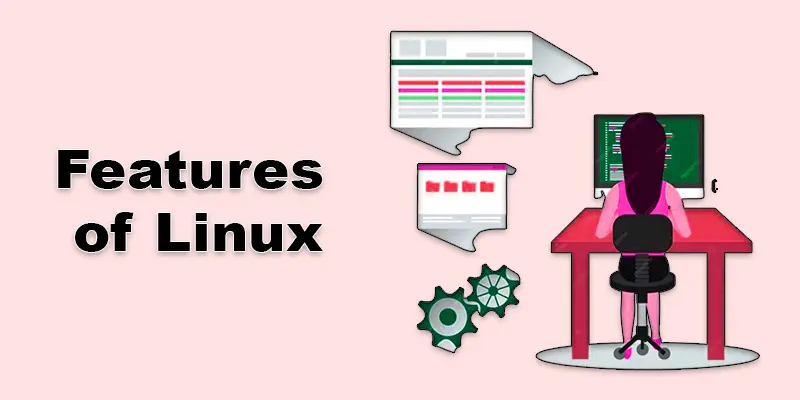Discover the Best Features of Linux Operating System
Published: 4 Feb 2025
Features of Linux Operating System
Did you know Linux powers over 90% of the world’s supercomputers and is a top choice for servers globally? But have you ever wondered why tech experts prefer Linux over other operating systems? If you’re frustrated with slow systems, frequent crashes, or expensive licenses, Linux offers a solution with its speed, reliability, and zero cost. Imagine an operating system that’s free, customizable, and incredibly secure—it’s not just a dream, it’s Linux. Let’s dive into its amazing features to see why it’s a favorite for tech enthusiasts and businesses alike.
What Makes Linux Unique
Linux is unique because it is open-source, meaning anyone can use, modify, and share it for free. Unlike other operating systems, it’s highly customizable, so you can change it to suit your needs. Linux is also very secure, with built-in features that protect your data from threats. It works well on almost any device, from personal computers to smartphones. Because it’s stable and rarely crashes, Linux is trusted by many servers and businesses worldwide.

Linux Operating System Features
The Linux operating system is known for its flexibility, security, and performance. It’s an open-source platform that powers everything from personal computers to servers, offering users a reliable and customizable experience.
- Open-Source
- Security
- Customizability
- Stability
- Performance
- Community Support
Open-Source
Anybody can view, use, and modify Linux’s source code when it is open-source. As a result, it is free for anyone who wants to try it or make changes. It’s important because it allows developers to customize the operating system to meet their needs and contribute improvements, which benefits everyone. For example, Ubuntu is a popular Linux distribution that’s open-source, giving users the freedom to adjust and share it while keeping it free of cost.
Security
Linux offers strong built-in protection through features like user permissions and firewalls, which help secure your system from unauthorized access. One of the reasons it is less prone to viruses than other operating systems is its security. You can simply manage who may access your files and what they can do with them when you use Linux. This makes it a reliable choice for users who prioritize security. For example, Linux is commonly used on servers that store sensitive information, such as banking or personal data, because of its strong protection.
Customizability
Linux is highly customizable, allowing users to change almost everything, from the desktop environment to the software and system settings. This means you can make it look and work the way you want, whether you’re a beginner or an expert. Customization makes Linux more flexible, as it can be tailored to suit specific needs, like using fewer resources for older computers. For example, Linux distributions like Ubuntu offer simple customization options, while others like Arch Linux provide advanced control for those who want to create a completely personalized system.

Stability
Linux is stable because it efficiently manages system resources and minimizes crashes. Unlike other operating systems, Linux doesn’t slow down even when handling multiple tasks. This reliability makes it a top choice for servers and businesses that require constant uptime. For example, many websites rely on Linux-based servers because it can run smoothly for months or even years without issues. Its stability is essential for critical systems, ensuring that they work without interruption.
Performance
Linux is known for using system resources efficiently, which means it runs faster and uses less memory and processing power. This makes it an ideal choice for older computers or devices with limited resources. Good performance is crucial because it ensures smooth multitasking, faster processing, and less lag, even when handling heavy tasks. For example, lightweight Linux distributions like Lubuntu are perfect for running on older laptops that might struggle with other operating systems.
Community Support
The Linux community is large and active, with users and developers always ready to help each other. Whether you’re a beginner or an expert, you’ll find plenty of forums, guides, and online resources to solve any problems. The support from this community makes learning and troubleshooting much easier. For example, websites like Stack Overflow and the Linux Mint community offer quick solutions and advice from experienced users.
How Linux Is Used in Real Life
- Servers – Linux powers many web servers, hosting websites and apps.
- Smartphones – Android, the most popular smartphone OS, is based on Linux.
- Personal Computers – Linux is an alternative to Windows and macOS for desktops and laptops.
- Embedded Systems – Used in devices like smart TVs, routers, and gaming consoles.
- Cloud Computing – Linux runs cloud services and virtual machines.
- Supercomputers – Many of the world’s fastest supercomputers run Linux.
- Development – Developers use Linux for software coding and testing.
- IoT Devices – Powers many Internet of Things (IoT) devices, like smart home gadgets.

Conclusion – About Features of Linux
Linux is a powerful, open-source operating system used in various real-life applications, from personal computing to enterprise-level solutions. It powers everything from smartphones and servers to supercomputers and embedded systems, offering reliability, security, and flexibility. With its vast potential and growing community, Linux encourages innovation and problem-solving. Don’t stop here—explore the Features of Linux Operating System to unlock even more possibilities and enhance your understanding of this incredible technology
FAQS – Linux Features
File permissions, safe booting, and user privilege control are just a few of Linux’s well-known security features. It uses access control lists (ACLs) and SELinux to control and restrict user access. Regular updates and an active open-source community also help address vulnerabilities quickly.
Distributions (distros) are different versions of Linux. Popular ones with varying features and user interfaces are Fedora, Debian, and Ubuntu. The choice depends on the user’s needs, such as ease of use or specialized functions for servers.
Linux is an open-source operating system that is highly customizable, reliable, and secure. It supports multitasking, multi-user capabilities, and offers a wide range of tools for developers. Linux is also free to use, making it a popular choice for both personal and business purposes.
A key feature of Linux is its open-source nature, which allows users to freely modify and distribute the software. It also provides strong security, customizability, and a wide range of available software. This makes Linux ideal for both beginners and advanced users.

- Be Respectful
- Stay Relevant
- Stay Positive
- True Feedback
- Encourage Discussion
- Avoid Spamming
- No Fake News
- Don't Copy-Paste
- No Personal Attacks

- Be Respectful
- Stay Relevant
- Stay Positive
- True Feedback
- Encourage Discussion
- Avoid Spamming
- No Fake News
- Don't Copy-Paste
- No Personal Attacks





